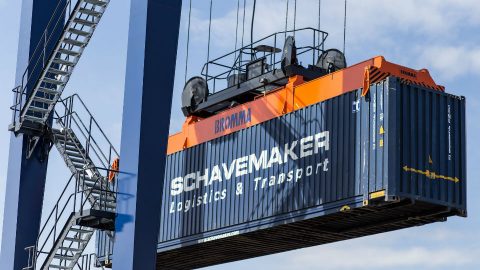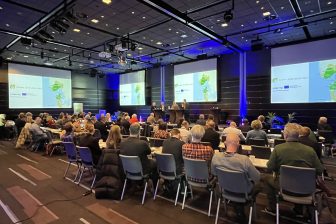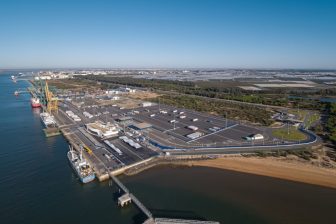
UK customs declaration in Wroclaw, Poland
Customers putting their cargo on the train in Wroclaw, Poland to the Dutch port of Moerdijk now do their customs declarations for export to the UK before getting onboard. This is thanks to a membership of rail terminal Wroclaw with Portbase, a digital platform linking all ports in the Netherlands.
This was explained by Susanne Dirksen, sales manager at Schavemakers Logistics and Transport. The company runs the terminal in southern Poland and since recently also runs a direct train service between this city and the Dutch port of Moerdijk. From this port, daily short-sea connections extend the transport link to the UK.
Pre-notification
The rail service mostly carries cargo in westward direction and is quite popular. The two round trips per week are usually fully loaded and a lot of this cargo continues its journey to the UK. After the Brexit, companies that transport goods via the Dutch ports to the UK will have to deal with customs formalities. Via Portbase these formalities are automated.
“We have taken a membership of Portbase for our customers transporting to the UK. Companies must pre-notify customs documents at our terminal in Wroclaw. If they have not done this, their cargo will not enter the terminal. With this digital system we prevent time-consuming manual checks at the Port of Moerdijk”, explained Dirksen.
On time
Apart from preventing chaos in the Dutch port, automation of the customs formalities also ensures punctuality of the new railway service, an important selling point, said Schavemakers. The freight train has been on track since April this year and since then, it has not faced any delays. “We market the service as a 30-hour journey, to be on the safe side. But in reality, the journey takes 24-26 hours from terminal to terminal”, said Dirksen.
We find it very important to remain punctual. When the customs formalities for UK transport are in place, companies may not directly have their documentation in place. Imagine that we find out about this at the terminal; we will have to take the container off the train. This takes a lot of time and delays journey.” She adds that up till now, companies in Poland do not seem to be aware of the implications of the Brexit.
Success story
In the Netherlands, connecting to Portbase is required for every transport company dealing with the UK. Portbase connects all parties in the logistics chains of the Dutch ports. The Port Community System (PCS) provides a digital connection to the smart ports of the Netherlands that makes it possible to exchange logistical data with organisations and governments.
The railway connection between the Port of Moerdijk and Wroclaw is the first direct line between the hubs. After being in the pipeline for two years it finally became a reality in April this year. “It has been a struggle, but we finally decided to take the risk and launch the service, regardless of the demand. Since we have started, the market response has been great and we are looking at a frequency increase in the short term”, said Dirksen.
Also read:





